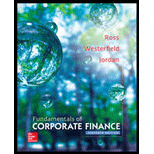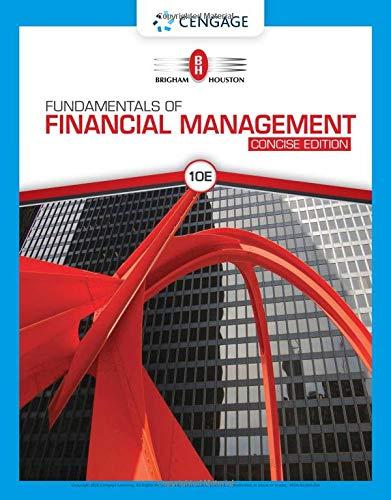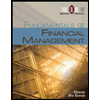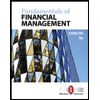
Fundamentals of Corporate Finance
11th Edition
ISBN: 9780077861704
Author: Stephen A. Ross Franco Modigliani Professor of Financial Economics Professor, Randolph W Westerfield Robert R. Dockson Deans Chair in Bus. Admin., Bradford D Jordan Professor
Publisher: McGraw-Hill Education
expand_more
expand_more
format_list_bulleted
Textbook Question
Chapter 13, Problem 10CRCT
Earnings and Stock Returns [LO1] As indicated by a number of examples in this chapter, earnings announcements by companies are closely followed by, and frequently result in, share price revisions. Two issues should come to mind. First, earnings announcements concern past periods. If the market values stocks based on expectations of the future, why are numbers summarizing past performance relevant?
Second, these announcements concern accounting earnings. Going back to Chapter 2, such earnings may have little to do with cash flow—so, again, why are they relevant?
Expert Solution & Answer
Want to see the full answer?
Check out a sample textbook solution
Students have asked these similar questions
Give possible answer.
Give possible answer.
Give possible help.
Chapter 13 Solutions
Fundamentals of Corporate Finance
Ch. 13.1 - How do we calculate the expected return on a...Ch. 13.1 - In words, how do we calculate the variance of the...Ch. 13.2 - What is a portfolio weight?Ch. 13.2 - How do we calculate the expected return on a...Ch. 13.2 - Is there a simple relationship between the...Ch. 13.3 - What are the two basic parts of a return?Ch. 13.3 - Under what conditions will a companys announcement...Ch. 13.4 - Prob. 13.4ACQCh. 13.4 - Prob. 13.4BCQCh. 13.5 - What happens to the standard deviation of return...
Ch. 13.5 - What is the principle of diversification?Ch. 13.5 - Why is some risk diversifiable? Why is some risk...Ch. 13.5 - Why cant systematic risk be diversified away?Ch. 13.6 - Prob. 13.6ACQCh. 13.6 - What does a beta coefficient measure?Ch. 13.6 - True or false: The expected return on a risky...Ch. 13.6 - How do you calculate a portfolio beta?Ch. 13.7 - Prob. 13.7ACQCh. 13.7 - What is the security market line? Why must all...Ch. 13.7 - Prob. 13.7CCQCh. 13.8 - If an investment has a positive NPV, would it plot...Ch. 13.8 - What is meant by the term cost of capital?Ch. 13 - Prob. 13.1CTFCh. 13 - Prob. 13.5CTFCh. 13 - Beta is a measure of what?Ch. 13 - The slope of the security market line is equal to...Ch. 13 - Where would a negative net present value project...Ch. 13 - Prob. 1CRCTCh. 13 - Prob. 2CRCTCh. 13 - Systematic versus Unsystematic Risk [LO3] Classify...Ch. 13 - Systematic versus Unsystematic Risk [LO3] Indicate...Ch. 13 - Prob. 5CRCTCh. 13 - Diversification [LO2] True or false: The most...Ch. 13 - Portfolio Risk [LO2] If a portfolio has a positive...Ch. 13 - Beta and CAPM[LO4] Is it possible that a risky...Ch. 13 - Corporate Downsizing [LO1] In recent years, it has...Ch. 13 - Earnings and Stock Returns [LO1] As indicated by a...Ch. 13 - Determining Portfolio Weights [LO1] What are the...Ch. 13 - Portfolio Expected Return [LO1] You own a...Ch. 13 - Portfolio Expected Return [LO1] You own a...Ch. 13 - Prob. 4QPCh. 13 - Prob. 5QPCh. 13 - Prob. 6QPCh. 13 - Calculating Returns and Standard Deviations [LO1]...Ch. 13 - Calculating Expected Returns [LO1] A portfolio is...Ch. 13 - Returns and Variances [LO1] Consider the following...Ch. 13 - Returns and Standard Deviations [LO1] Consider the...Ch. 13 - Calculating Portfolio Betas [LO4] You own a stock...Ch. 13 - Calculating Portfolio Betas [LO4] You own a...Ch. 13 - Using CAPM[LO4] A stock has a beta of 1.15, the...Ch. 13 - Using CAPM[LO4] A stock has an expected return of...Ch. 13 - Using CAPM [LO4] A stock has an expected return of...Ch. 13 - Using CAPM [LO4] A stock has an expected return of...Ch. 13 - Using the SML[LO4] Asset W has an expected return...Ch. 13 - Reward-to-Risk Ratios [LO4] Stock Y has a beta of...Ch. 13 - Reward-to-Risk Ratios [LO4] In the previous...Ch. 13 - Using CAPM [LO4] A stock has a beta of 1.14 and an...Ch. 13 - Portfolio Returns [LO2] Using information from the...Ch. 13 - Prob. 22QPCh. 13 - Portfolio Returns and Deviations [LO2] Consider...Ch. 13 - Analyzing a Portfolio [LO2, 4] You want to create...Ch. 13 - Analyzing a Portfolio [LO2, 4] You have 100,000 to...Ch. 13 - Systematic versus Unsystematic Risk [LO3] Consider...Ch. 13 - SML [LO4] Suppose you observe the following...Ch. 13 - SML [LO4] Suppose you observe the following...Ch. 13 - Prob. 1MCh. 13 - Beta is often estimated by linear regression. A...Ch. 13 - Prob. 3MCh. 13 - Prob. 4MCh. 13 - Prob. 5M
Knowledge Booster
Learn more about
Need a deep-dive on the concept behind this application? Look no further. Learn more about this topic, finance and related others by exploring similar questions and additional content below.Similar questions
arrow_back_ios
SEE MORE QUESTIONS
arrow_forward_ios
Recommended textbooks for you
 Intermediate Accounting: Reporting And AnalysisAccountingISBN:9781337788281Author:James M. Wahlen, Jefferson P. Jones, Donald PagachPublisher:Cengage Learning
Intermediate Accounting: Reporting And AnalysisAccountingISBN:9781337788281Author:James M. Wahlen, Jefferson P. Jones, Donald PagachPublisher:Cengage Learning Fundamentals Of Financial Management, Concise Edi...FinanceISBN:9781337902571Author:Eugene F. Brigham, Joel F. HoustonPublisher:Cengage Learning
Fundamentals Of Financial Management, Concise Edi...FinanceISBN:9781337902571Author:Eugene F. Brigham, Joel F. HoustonPublisher:Cengage Learning Fundamentals of Financial Management, Concise Edi...FinanceISBN:9781285065137Author:Eugene F. Brigham, Joel F. HoustonPublisher:Cengage Learning
Fundamentals of Financial Management, Concise Edi...FinanceISBN:9781285065137Author:Eugene F. Brigham, Joel F. HoustonPublisher:Cengage Learning Fundamentals of Financial Management, Concise Edi...FinanceISBN:9781305635937Author:Eugene F. Brigham, Joel F. HoustonPublisher:Cengage Learning
Fundamentals of Financial Management, Concise Edi...FinanceISBN:9781305635937Author:Eugene F. Brigham, Joel F. HoustonPublisher:Cengage Learning Financial Reporting, Financial Statement Analysis...FinanceISBN:9781285190907Author:James M. Wahlen, Stephen P. Baginski, Mark BradshawPublisher:Cengage Learning
Financial Reporting, Financial Statement Analysis...FinanceISBN:9781285190907Author:James M. Wahlen, Stephen P. Baginski, Mark BradshawPublisher:Cengage Learning

Intermediate Accounting: Reporting And Analysis
Accounting
ISBN:9781337788281
Author:James M. Wahlen, Jefferson P. Jones, Donald Pagach
Publisher:Cengage Learning

Fundamentals Of Financial Management, Concise Edi...
Finance
ISBN:9781337902571
Author:Eugene F. Brigham, Joel F. Houston
Publisher:Cengage Learning

Fundamentals of Financial Management, Concise Edi...
Finance
ISBN:9781285065137
Author:Eugene F. Brigham, Joel F. Houston
Publisher:Cengage Learning

Fundamentals of Financial Management, Concise Edi...
Finance
ISBN:9781305635937
Author:Eugene F. Brigham, Joel F. Houston
Publisher:Cengage Learning

Financial Reporting, Financial Statement Analysis...
Finance
ISBN:9781285190907
Author:James M. Wahlen, Stephen P. Baginski, Mark Bradshaw
Publisher:Cengage Learning
8 Common Investor Biases (And How to Overcome Them); Author: Next Level Life;https://www.youtube.com/watch?v=7btv02RgCzo;License: Standard Youtube License